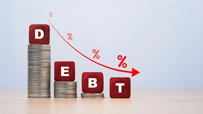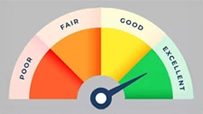Is Closing Your Home Loan Early Good or Bad for Your Credit Score?
September 03, 2025

In the world of personal finance, owning a home is often seen as the pinnacle of financial stability. But the flip side of that dream is the long-term commitment to home loan EMIs. With rising incomes and better financial planning, many borrowers now explore the idea of foreclosing their home loan—essentially repaying the loan amount in full before the original tenure ends.
Sounds financially smart, right? But here’s the twist: foreclosing a home loan can impact your credit score, for better or worse. In this blog, we’ll explore whether home loan foreclosure is good or bad for your CIBIL score, and help you make the most informed decision possible.
What is Home Loan Foreclosure?
Home loan foreclosure, also known as loan pre-closure, is the process of repaying your entire outstanding home loan in one lump sum before your scheduled tenure ends.
For example, if you have a 20-year home loan but manage to pay it off in 10 years, that’s a foreclosure. The main reason people consider this option is to save on interest payments and become debt-free earlier.
But before you rush to close that loan, it’s essential to weigh the credit score implications.
How Foreclosing a Home Loan Can Help Your Credit Score
Demonstrates Strong Financial Discipline
If you’ve never missed an EMI and then choose to foreclose your home loan, it’s a big green flag to credit bureaus. It shows you're not only consistent but also proactive in managing your finances.
Reduces Debt-to-Income Ratio
The debt-to-income ratio (DTI) is a key factor in calculating your CIBIL score. Closing a significant debt like a home loan lowers your DTI, which can improve your creditworthiness in the eyes of lenders.
Improved Loan Eligibility
Once your home loan is foreclosed, your monthly EMI obligations reduce. This increases your eligibility for other loans—like a bike loan, business loan, or even another home loan—with potentially better terms.
Saves on Interest Payments
Although this doesn’t directly impact your credit score, saving lakhs in interest gives you more financial freedom—which indirectly supports healthier credit habits.
How Foreclosing a Home Loan Can Hurt Your Credit Score
Temporary Dip in CIBIL Score
This might sound surprising, but foreclosing a home loan can lead to a short-term drop in your credit score, especially if the foreclosure happens very early into the loan tenure. Why? Because you're shortening your credit history, which is one of the key parameters in scoring models.
Impact on Credit Mix
A healthy mix of secured (like home loans) and unsecured (like personal loans) credit types boosts your CIBIL score. Foreclosing a long-term secured loan can skew this balance.
Loss of Long-Term Positive History
Home loans are typically long-term, and regular, on-time payments can boost your score over time. When you foreclose early, you miss out on building that lengthy, positive credit history.
Prepayment Penalties
Although many lenders in India have waived prepayment penalties for floating-rate home loans, fixed-rate loans may still attract a fee. While this doesn’t impact your credit score, it does affect the financial viability of foreclosure
Expert Tip: Timing Is Everything
According to credit experts, foreclosing your home loan after maintaining a good repayment track record for a few years is the sweet spot. This ensures that you’ve built a decent credit history before closure, keeping your score stable or even improving it.
Also, make sure your bank reports the loan status as “Closed” (not “Settled”) to credit bureaus like CIBIL. A “Settled” tag implies that you didn’t pay the loan in full and can significantly damage your credit score.
Final Thoughts
The answer depends on how and when you do it. If you've paid your EMIs regularly for several years and are now financially capable of foreclosing your home loan, you could go for it. You’ll enjoy peace of mind, save interest, and your CIBIL score will likely remain stable. But if you’re planning to foreclose too early in the tenure, without a consistent EMI history, you might see a temporary dip in your credit score, and lose out on long-term credit-building benefits.
In short, home loan foreclosure is a great move if done strategically—and if your long-term financial goals are aligned.
Buying a house has never been this easy! Avail Ujjivan SFB’s wide range of affordable home loan products and enjoy a hassle-free loan journey. From house purchase loan to plot loans and home improvement loans, we have it all! Alternatively, you can browse through Ujjivan SFB product suite - our wide range of financial products are designed to make your financial life better.
Disclaimer:
The contents herein are only for informational purposes and generic in nature. The content does not amount to an offer, invitation or solicitation of any kind to buy or sell, and are not intended to create any legal rights or obligations. This information is subject to updation, completion, amendment and verification without notice. The contents herein are also subject to other product-specific terms and conditions, as well as any applicable third-party terms and conditions, for which Ujjivan Small Finance Bank assumes no responsibility or liability.
Nothing contained herein is intended to constitute financial, investment, legal, tax, or any other professional advice or opinion. Please obtain professional advice before making investment or any other decisions. Any investment decisions that may be made by the you shall be at your own sole discretion, independent analysis and evaluation of the risks involved. The use of any information set out in this document is entirely at the user’s own risk. Ujjivan Small Finance Bank Limited makes no representation or warranty, express or implied, as to the accuracy and completeness for any information herein. The Bank disclaims any and all liability for any loss or damage (direct, indirect, consequential, or otherwise) incurred by you due to use of or due to investment, product application decisions made by you on the basis of the contents herein. While the information is prepared in good faith from sources deemed reliable (including public sources), the Bank disclaims any liability with respect to accuracy of information or any error or omission or any loss or damage incurred by anyone in reliance on the contents herein, in any manner whatsoever.
To know more about Ujjivan Small Finance Bank Products Visit:"https://www.ujjivansfb.in"
All intellectual property rights, including copyrights, trademarks, and other proprietary rights, pertaining to the content and materials displayed herein, belong
to Ujjivan Small Finance Bank Limited or its licensors. Unauthorised use or misuse of any intellectual property, or other content displayed herein is strictly prohibited and the same is not intended for distribution to, or use by, any person in any jurisdiction where such distribution or use would (by reason of that person’s nationality, residence or otherwise) be contrary to law or registration or would subject Ujjivan Small Finance Bank Limited or its affiliates to any licensing or registration requirements.
FAQs
1. Does home loan foreclosure always improve the CIBIL score?
Not always. It depends on the repayment history and how long you've had the loan. If foreclosed after several years of timely EMIs, it usually has a positive or neutral effect.
2. Will my credit score drop if I foreclose my home loan early?
Yes, a slight dip is possible, especially if foreclosed too early before building a solid credit history.
3. Is foreclosure better than making regular EMI payments till the end?
Financially, foreclosure saves you on interest. But from a credit score perspective, regular on-time EMIs also help build your CIBIL score.
4. Do banks charge foreclosure fees on home loans?
Most floating-rate home loans have no foreclosure charges. Fixed-rate loans may have a 1–3% prepayment penalty.
5. How should I inform my bank about the foreclosure?
You need to submit a written request, settle the outstanding balance, and collect a "No Dues Certificate" and "Loan Closure Letter" for records.
6. How soon does the credit score reflect the foreclosure?
Usually within 30–45 days after the bank updates your loan status with credit bureaus.
7. Can foreclosure hurt my chances of future loan approvals?
Unlikely. If done correctly and reported as "Closed", foreclosure improves your financial image to lenders.
8. Should I use my emergency fund to foreclose my home loan?
Not advisable. Only foreclose if you have surplus funds after securing your emergency and retirement savings.
9. What’s better: partial prepayment or full foreclosure?
Partial prepayment helps reduce your EMI or tenure without affecting your credit history. Full foreclosure eliminates the debt but shortens your credit track record.
10. Can I foreclose a joint home loan?
Yes, but all co-borrowers must be present or provide consent. The loan account will be closed for all involved parties.
Latest Blogs

APK Fraud: How One Wrong Download Could Empty Your Bank Account
May 13, 2025
Picture this. You’re sipping your evening tea when your phone rings.

Gold Loan LTV Ratio Explained (75% to 85%): What It Means for Borrowers
March 20, 2025
In June 2025, the Reserve Bank of India (RBI) introduced a significant relaxation for gold loan borrowers: the maximum Loan-to-Value (LTV) ratio for loans below ₹2.5 lakh was raised to 85%, up from the long-standing cap of 75%. Loans between ₹2.5 lakh and ₹5 lakh can now go up to 80%, while loans above ₹5 lakh continue under the 75% ceiling.

Good Debt vs Bad Debt: Learn the Difference
August 13, 2025
Every month, millions of Indians wait for the familiar debit alert, an EMI deducted from their account.

Got a Tax Refund? 5 Smart Ways to Put Your 2025 Refund to Work
August 13, 2025
For many taxpayers, there’s a unique sense of relief when a tax refund arrives.

Credit Score Not Improving? 5 Mistakes You Might Be Making
August 13, 2025
For most of us, a credit score feels like a silent judge sitting in the background of our financial lives.




